The Impact of AI on traditional job markets. The rise of AI is altering labor markets across sectors. It automates tasks, changes sectors, and updates needed skills. This technology is changing how we work. Companies using AI face challenges and chances in the future of jobs.
AI affects many areas, from making things to serving customers and office jobs. It helps businesses work better, faster, and more efficiently. But, it also means some jobs might disappear, worrying about job security and the need for workers to adapt.
Yet, AI also brings new job chances, like AI skills and jobs that mix human and machine work. To keep up, we need to focus on learning digital skills and keeping our skills up to date.
Understanding AI’s effect on jobs is key as work changes. By looking at the main AI technologies, seeing which jobs are most changed, and finding new job chances, we can get ready for the AI job world.
Key Takeaways:
- Artificial intelligence is changing job markets by automating tasks, changing industries, and updating skills needed.
- The impact of AI is wide, affecting many sectors like making things, serving customers, and office jobs.
- While AI might replace some jobs, it also opens up new chances for AI skills and jobs that mix human and machine work.
- Changing and retraining are key to managing the shifting job world in the AI era.
- Recognizing how AI affects employment is essential for businesses and individuals to stay ahead in the changing opportunities for employment.
Recognizing AI’s Contribution to Change in the Workplace
AI is rapidly changing the way we conduct business. AI is not merely an idea from the future. It’s already changing how we work and interact today.
Defining Artificial Intelligence in the Workplace Context
AI in the workplace refers to the application of cutting-edge technologies such as robotic automation and machine learning. These tools help us do tasks better and make smarter decisions. They work with us, not against us.
Key Technologies Driving Workplace Change
- AI calculations that can examine huge volumes of information and spot examples to further develop work processes and show up at shrewd decisions.
- Mechanical interaction computerization (RPA) can robotize routine assignments, opening up human work for additional significant errands.
- Normal language handling (NLP) makes it simpler to speak with machines for applications, for example, voice orders and savvy aides.
Current State of AI Implementation
An increasing number of businesses are using artificial intelligence. According to studies, more than half of organizations have already begun to use AI. They’re using it to improve customer service and streamline operations. But, there are also challenges like keeping data safe and making sure AI is fair.
| Industry | AI Implementation | Key Applications |
|---|---|---|
| Healthcare | 45% | Medical diagnosis, drug discovery, and patient data analysis |
| Finance | 62% | Fraud detection, investment portfolio optimization, and customer service automation |
| Retail | 58% | Personalized product recommendations, inventory management, and predictive analytics |
As the workforce transformation and technological unemployment shape the future, knowing about AI is key. It helps both employers and employees adapt to the new work world.
The Impact of AI on Traditional Job Markets
Job markets are undergoing significant change due to artificial intelligence (AI). AI job displacement and labor market disruption are big worries. This tech is changing how we work.
AI is automating jobs that humans used to do. It’s in manufacturing, production, and service jobs. AI does tasks better and faster than people. This makes some worry about job losses as companies use AI to save money and work better.
But AI isn’t all bad for jobs. Some jobs may disappear, but new ones are on the horizon. People with experience working with AI, such as data scientists and AI ethicists, are needed. These new jobs are creating new career paths.
As AI changes jobs, workers and bosses need to get ready. Learning skills like digital literacy and critical thinking is key. People can maintain their competitiveness in the employment market by having these talents.
“Traditional labor markets will undoubtedly be disrupted by the expansion of AI, but it also offers new opportunities for development and creativity. Instead of fighting this change, the important thing is to be ready for it and welcome it.”
Understanding how AI impacts employment aids in adapting to the changes. It is really important to have an open mind and be adaptable. Being prepared for the AI-driven economy is particularly important as the nature of work changes.
The Domains Most Affected by Automation and AI
Automation and AI are drastically altering the work market. This shift is more obvious in some industries than others. Manufacturing, service sectors, and white-collar jobs are seeing big changes.
Production & Manufacturing Industries
The assembling and modern areas are driving the way in mechanization and man-made reasoning. In light of innovation like mechanical cycle robotization and AI, assignments are becoming more straightforward. This is making some jobs less needed, leading to skill obsolescence for workers.
Service Industry Disruption
The service sector, including retail and hospitality, is also changing a lot. AI-powered chatbots and predictive analytics are taking over tasks like customer service and scheduling. This means workers need new skills and some jobs are disappearing.
White-collar Professions at Risk
Even jobs in accounting, legal, and finance are feeling the effects of AI and automation. Smart software can now do tasks like data analysis and legal research. This is making some jobs less necessary, leading to skill obsolescence.
| The industry | Impact of AI and Automation | Impacted Job Positions |
|---|---|---|
| Manufacturing | Automation of robotic processes, computer vision, and machine learning | Workers on assembly lines and quality control experts |
| Service Sector | Virtual assistants, chatbots, and predictive analytics | Data analysts and customer service agents |
| Careers in White-Collar Jobs | Intelligent software for legal research, document assessment, and data analysis | Financial analysts, attorneys, and accountants |
“There is no denying the impact of automation and artificial intelligence on traditional job markets, as we observe substantial disruption in a number of industries. Staying ahead of these changes will require a strategic approach to reskilling and workforce adaptation.”
Job Displacement and Creation in the AI Era
The workplace is going through major change due to artificial intelligence (AI). It brings both job loss and new career chances. The effect of AI on jobs is complex and needs careful study.
Some jobs are at risk from AI automation, which will result in technological unemployment. According to research, AI and other technologies might replace 14% to 47% of occupations.
But AI also brings new jobs and industries. The future of work is not just about losing jobs. It’s also about new AI jobs and roles that mix human and machine skills. AI lets workers do more creative and strategic work.
The impact on jobs is still unclear. But, Changing to an AI economy will need a lot of training. To prosper in the job of the future, workers will have to obtain new skills.
“Humans and machines, not both machines and people, will be the focus of the the workplace of the future.”
As the shifts in the nature of work, we must all work together. The possibilities and difficulties posed by AI in the workplace must be dealt with by legislators, businesses, and workers.
New Career Routes and Emerging Opportunities
The workforce is evolving fast, thanks to AI. New avenues for employment are opening up. These jobs offer fresh methods for experts to use their skills in the future of work.
Career Opportunities Associated with AI
AI is producing a lot of new jobs. AI engineers, machine learning experts, data scientists, and consultants for automation are among the jobs available. The transformation of the workforce needs people with AI skills.
Areas of the AI Economy That Are Growing
AI is increasing in frequency in the fields of healthcare, finance, and transit. This means more jobs in these regions. There is a great need for those who understand how to apply AI in their line of work.
Hybrid Positions Using Both AI and Human Skills
- The future will see jobs that mix human skills with AI.
- These positions could involve managing human-AI teams, creating AI systems, and incorporating AI into business.
- In these positions, people with technical, analytical, and soft abilities will excel.
The workforce transformation brought by AI offers many chances. By learning new skills, you can lead in the future of work. Embracing these new paths can help you shape the AI economy.
Competencies Needed in the AI-Powered Workplace
AI is changing the job market fast. Workers need to keep learning new skills to stay ahead. This is key for staying cutthroat and versatile in a tech-driven world.
At the heart of the AI workplace are technical skills. These include data analysis, programming, and machine learning. Workers must learn to use AI insights to help businesses succeed.
Employers also want people with strong human-machine collaboration skills. Being able to work well with AI, solve problems together, and use AI’s strengths is vital. This is how innovation and productivity grow.
Delicate abilities are similarly as significant. Abilities like flexibility, decisive reasoning, and an adoration for learning are significant. Laborers need to continue figuring out how to satisfy the changing needs of the reskilling and upskilling world.
| Technical Abilities | The Soft Skills |
|---|---|
| Machine learning, programming, and data analysis | Flexibility Thinking critically Ongoing education |
Workers who mix technical skills with human abilities will do well in the AI workplace. This mix prepares them for the future.
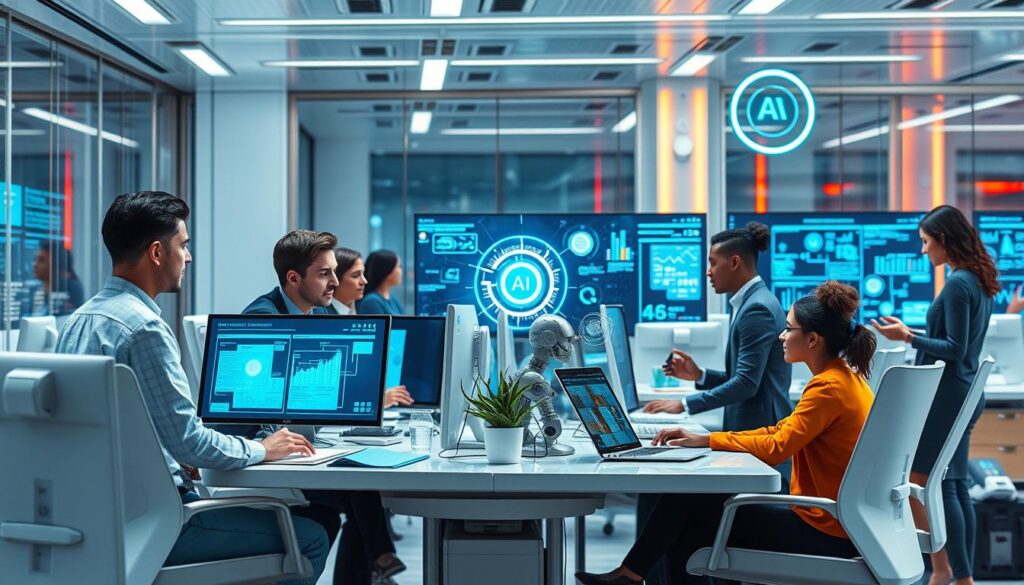
“The future of work is not about People versus machines, but about humans and machines cooperating.”
Techniques for Reskilling and Workforce Adaptation
As simulated intelligence changes the labor force, it’s key for workers to master new abilities. They need to adjust to the simulated intelligence driven working environment. This means getting better at digital skills and keeping up with professional growth.
Essential Digital Literacy Skills
In this day and age, advanced abilities are significant. Representatives should know how to function with computer based intelligence and new tech. They need to be good at data analysis, programming, and digital communication.
- Data analysis and visualization
- Proficiency in programming and coding
- Effective digital communication and collaboration
- Understanding of AI-powered automation and decision-making
Professional Development in the AI Age
Employees also need to keep learning. They should get certifications, go to training, or join online courses. This helps them stay ahead in the AI job market.
- Certification programs in AI, machine learning, and data science
- Specialized training workshops and bootcamps
- Online learning platforms for continuous skill development
- Mentorship and peer-to-peer knowledge sharing
Corporate Training Programs
These days, businesses prioritize reskilling and upskilling their employees. They offer training to help employees adapt to AI. This boosts both personal and company success.
| Important Elements of Business Training Initiatives | Objectives |
|---|---|
| Digital Literacy Workshops | Equip employees with essential digital skills for AI-driven work |
| AI and Automation Upskilling | Prepare employees to collaborate effectively with AI systems |
| Leadership Development for the AI Age | Cultivate adaptive leadership skills to navigate workforce transformation |
| Continuous Learning Opportunities | Encourage a culture of lifelong learning and adaptability |
By investing in reskilling and upskilling, companies can fully use AI. This guarantees their success in the rapidly evolving digital environment.
“The eventual fate of work isn’t about people versus machines, however about people and machines cooperating.”
Human-AI Collaboration: The New Workplace Dynamic
The working environment is developing because of man-made brainpower (computer based intelligence). Now, humans and machines work together. This partnership could change how we work and make us more productive and creative.
AI and humans have different strengths. Artificial intelligence succeeds at doing dreary positions and information examination. People are more capable at critical thinking and innovativeness. When joined, they can do unbelievable accomplishments.
Augmenting Human Capabilities
AI can help humans in many ways. It can automate simple tasks and give insights in real-time. This lets people focus on more important work. It makes work better and more efficient.
Developing Complementary Skills
People must acquire new abilities in order to work effectively with AI. They need to know how to use AI and understand its insights. This helps everyone work better together.
Strategies for Effective Teamwork
- Establish clear roles and responsibilities for human and AI team members
- Foster a culture of trust and transparency, ensuring seamless information sharing
- Provide training and continuous learning opportunities to upskill employees
- Continuously evaluate and refine the collaboration between humans and AI
As we move forward, working with AI will be key. It will help businesses innovate and make better decisions. Additionally, it will strengthen and adapt the workforce.
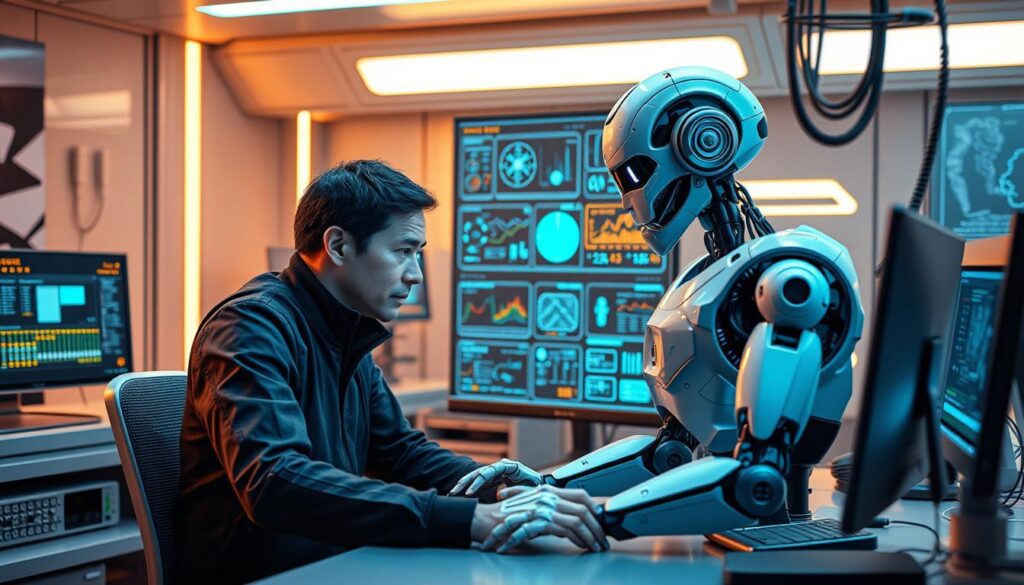
Conclusion
AI’s effects on conventional employment markets. (AI) on employment is evident. Automation and AI are altering the way we work. This presents opportunities as well as difficulties for the nature of work in the future.
Jobs in manufacturing, service, and white-collar fields might change or even disappear. But, the AI economy also opens up new career paths. Roles that mix human skills with AI are growing in value. Fields like data analysis, machine learning, and AI development are seeing big growth.
To keep up, workers and companies need to keep learning and stay adaptable. Reskilling and training programs are key to getting ready for the AI workplace. By working together with AI, we can make the most of the future of work and protect traditional jobs.
FAQ
How does AI affect conventional job markets?
Via mechanizing undertakings, man-made brainpower (computer based intelligence) is changing the work area. A few positions are lost thus, however new ones are likewise made. Artificial intelligence is changing the idea of work in different enterprises, which will affect work from here on out.
What changes is AI bringing about in the workplace?
AI is altering labor in the same way that robotic automation and machine learning have. It is creating new jobs while making others redundant. Furthermore, it is changing the way humans and robots collaborate.
Which areas are generally influenced via mechanization and man-made consciousness?
Robotization and man-made reasoning are huge movements for middle class occupations, the assembling area, and the assistance area. Creation, client assistance, and managerial positions are defenseless against mechanization.
In the AI era, how are employment creation and displacement balanced?
While AI is producing new employment, it is also causing some jobs to go. The overall impact on employment is complicated. More jobs are being lost in some industries and places than in others.
What new chances and career routes are there in the AI economy?
The AI economy is creating new vocations such as data scientists and AI engineers. Additionally, hybrid vocations that integrate AI and human skills are becoming increasingly valuable.
What abilities are necessary to thrive in a workplace driven by AI?
To succeed in a simulated intelligence-driven workplace, one must possess specialized skills like as information analysis. Additionally essential are delicate skills like decisive reasoning and critical thinking. Maintaining awareness of new capabilities is very important.
How could organizations and laborers prepare for the fate of computer based intelligence driven work environments?
To adjust to man-made intelligence, organizations and representatives ought to put a high need on computerized education. Putting resources into preparing and upskilling is fundamental. Using AI and embracing lifelong learning will make navigating these shifts easier.




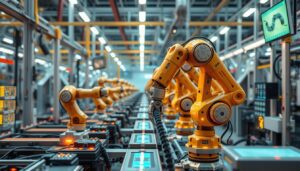
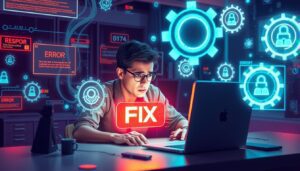
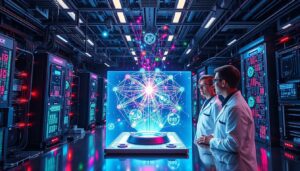
1 thought on “The Impact of AI on Traditional Job Markets: Pros & Cons”